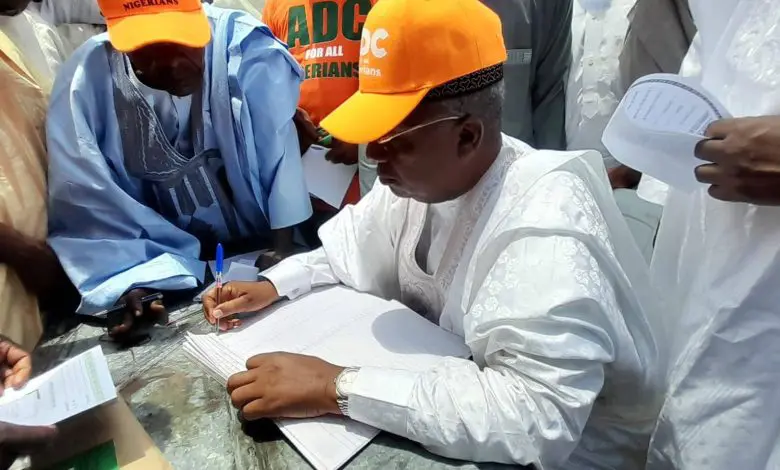A former governor of Nigeria’s Adamawa State, Umaru Jibrilla Bindow, has officially defected to the African Democratic Congress (ADC), becoming the latest high-profile figure from the region to align with the opposition party. The move marks a significant shift in the state’s political dynamics ahead of future elections.
Bindow, who governed Adamawa from 2015 to 2019 under the ruling All Progressives Congress (APC) and previously served as a senator for the Adamawa North Zone between 2011 and 2015, finalized his ADC membership on Monday. He registered at his local ward in Mubi North Local Government Area, where he received his party membership card. His defection follows similar moves by two other prominent Adamawa politicians: former Vice President Atiku Abubakar, the 2023 presidential candidate of the Peoples Democratic Party (PDP), and Senator Aishatu Binani, the APC’s 2023 governorship candidate in Adamawa.
The ADC, often positioned as a coalition party, appears to be gaining traction as a platform for politicians distancing themselves from Nigeria’s two dominant parties. Bindow’s exit from the APC underscores simmering realignments within the state’s political landscape, particularly after Binani’s closely contested and controversial gubernatorial bid last year. Atiku’s earlier move to the ADC — though he retains ties to the PDP — and Binani’s subsequent shift have drawn attention to the party’s growing influence as a potential third force.
Adamawa, a northeastern state with a history of competitive elections, has seen increased political maneuvering since the 2023 general polls. Bindow’s defection is viewed by analysts as a strategic effort to leverage his regional influence within a party that may offer greater flexibility in coalition-building. Though he did not contest the last governorship election, his tenure as governor was marked by infrastructure projects and efforts to address insecurity, a legacy that could bolster his standing within the ADC.
The ADC, established in 2005, has historically played a minor role in national politics but has recently attracted defectors disillusioned with the APC and PDP. While the party has yet to secure major electoral victories, the influx of established figures like Bindow, Atiku, and Binani signals its ambition to reshape Nigeria’s political hierarchy. In Adamawa, where voter sentiment often swings between the APC and PDP, the ADC’s emerging coalition could challenge traditional voting patterns.
As political realignments continue, observers are closely monitoring how these shifts might influence upcoming local and national elections. Bindow’s move, coupled with the ADC’s expanding roster, highlights the fluidity of Nigeria’s party politics and the strategic calculations of leaders navigating an evolving democratic landscape.
